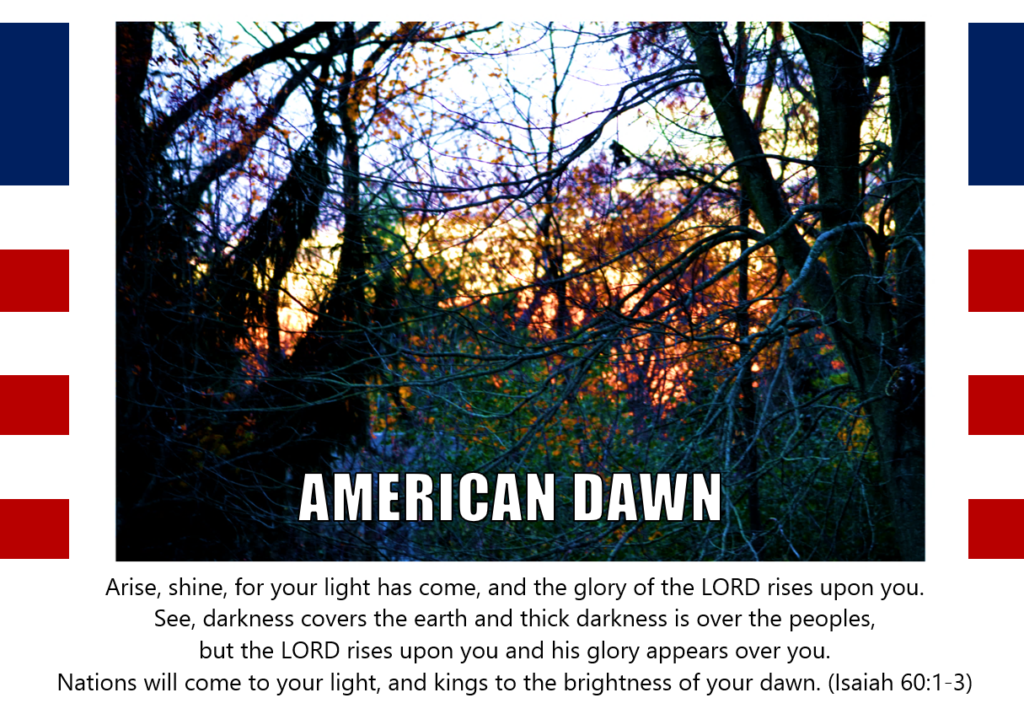Why Would God Bless America? Part 2: Freedom
It’s easy to see why God wouldn’t bless America.
But why would He give us an American dawn?

Let’s continue to explore why God might bless America, in particular the Church in America…through the coronavirus pandemic.
In Part 1, we considered that God sees purification (individually and as the Church) as a good thing, but moreover, God thinks freedom is pretty important
One of the lessons I’ve really been taking to heart during the coronavirus pandemic and the worldwide response of social distancing and stay-at-home orders is that in the name of safety, we are willingly laying aside some of our freedoms… for the moment. A simple sacrifice for some, a source of deep concern for others because they fear the insidious slave masters…the ones who like freedom for themselves but really don’t like it for other people.
Even for those of us who enjoy time at home, we like doing it when we want and not because we’ve been told we must. For us, it’s an issue of independence and freedom from government control. To be told we must remain inside feels like bondage. After all, even in the Passover, the Jews didn’t have to stay inside for months. They were told what to eat, but it didn’t become a permanent daily ritual. After the plague of the firstborn had passed, life returned to normal until they left Egypt and new normal emerged as those delivered from slavery.
Freedom is important enough to God to make it a running theme in the Bible from Garden to Garden, tree to tree.
In Genesis, there is a record of freedom (Genesis 2:16) to eat from trees. In the ministry of Christ (Luke 4:18) , there is freedom for the oppressed, fulfilled ultimately through the tree called the Cross. We were set free from sin and death. And another final freedom in Revelation’s tree of life (Revelation 22) and the free gift of the water of life.
If God loves freedom, why is there bondage? In Genesis we were free to eat, but a singular command, a boundary to our freedom was given. It’s a boundary we transgressed when Adam and Eve used their freedom wrongly and ate from the tree of the knowledge of good and evil. It’s freedom we misused (and the consequence of death) that required the Cross to restore so that we could be “free indeed” (John 8:36) by the blood of Christ.
It is the same blood of Christ required when we misuse our liberty and turn it into license. It is the same blood of Christ when we throw away our freedom and become slaves to sin and sinners. (Hold that thought.)
Why would God like freedom and hate bondage?
God hates bondage, the loss of freedom, because of what bondage does. First and foremost, the Image of God in each of us should submit to none other than God. Ultimately, it is He whose liberty any forced bondage of mankind challenges. When we reject Him, we have rulership by another.
God’s rulership is filled with freedom–an equality of mankind from every race, tribe, and language–a kingdom of priests serving our God. “Now the Lord is the Spirit, and where the Spirit of the Lord is, there is freedom” (2 Corinthians 3:17).
Man’s rulership has a long arc always toward oppression and bondage. It divides. It conquers one another. It forces and enforces. The opposite of freedom isn’t safety. It’s power and control. Think back to when the Israelites wanted a king to rule over them instead of God, He told us what would happen. They would forsake freedom for bondage.
Questions for thought:
- How can we submit to our rulers (as Scripture commands in Romans 13) while simultaneously resisting any efforts to make us their slaves?
- How does submitting first to God (in whom there is freedom) give us discernment and the ability to speak the truth in love? How is submitting to God key to keep us from forsaking freedom for safety?
- When we stay at home our mobility is limited temporarily, our rights to peacefully assemble are laid aside temporarily, but in Christ, have we lost our ability to worship…even temporarily?
- We often read “Those who would give up essential liberty, to purchase a little temporary safety, deserve neither liberty nor safety.” Benjamin Franklin (1706-1790). In what way does true freedom stand in direct tension (not conflict) with safety? How does God deliver both in the eternal sense? Does He guarantee both in the earthly sense?
- What does God value more: freedom or safety? How do life and freedom come as a boxed set with God?
- If my freedom stands in the way of another’s safety, what does God say about that? Read Galatians 5, particularly verses 13-18 and see. (More on this tomorrow.)
- Return to the thought of liberty and license, to freedom from slavery and sin. What do those say about bondage and sin with coronavirus, life/health, economic freedom and “house arrest” by government masters (for whatever length of time)? I don’t pretend to have an answer but to say it is genuinely complicated and requires great discernment to hold a biblical worldview.
- Read “Greater love has no one than this: to lay down one’s life for one’s friends.” (John 15:13). Did Jesus lay aside His freedoms and His rights to serve us? Did He become our servant? What is the distinction between a servant (a free slave) and a slave in bondage? What is the core issue?
- What does it mean to follow Jesus in such times?
- How should the Church help us to understand the nuances of submission and living as citizens of two kingdoms: God’s and civil society?


Leave a Reply